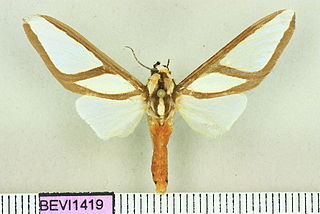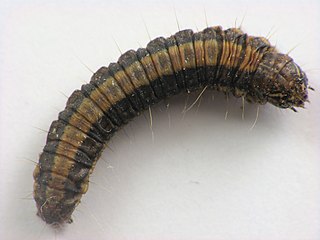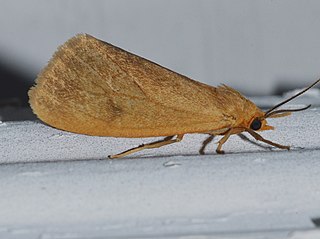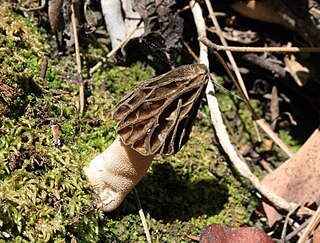
Crambinae is a large subfamily of the lepidopteran family Crambidae, the crambid snout moths. It currently includes over 1,800 species worldwide. The larvae are root feeders or stem borers, mostly on grasses. A few species are pests of sod grasses, maize, sugar cane, rice, and other Poaceae. The monophyly of this group is supported by the structure of the tympanal organs and the phallus attached medially to the juxta.

Amphipyrinae is a subfamily of owlet moths in the family Noctuidae. There are more than 50 genera and 210 described species in Amphipyrinae, although the classifications are likely to change over time.
Grote is a surname. Notable people with the surname include:

Carathis is a genus of moths in the family Erebidae. The genus was described by Augustus Radcliffe Grote in 1866.

Robinsonia is a genus of moths in the family Erebidae. The genus was erected by Augustus Radcliffe Grote in 1866.

Virbia is a genus of tiger moths in the family Erebidae. The genus was erected by Francis Walker in 1854.

Pyrausta is a speciose genus of moths of the family Crambidae. The genus was erected by Franz von Paula Schrank in 1802.

Gabara is a genus of moths in the family Erebidae. The genus was erected by Francis Walker in 1866.

Heliomata is a genus of moths in the family Geometridae.

Datana is a genus of moths of the family Notodontidae. The genus was erected by Francis Walker in 1855.
The Grote Chair of the Philosophy of Mind and Logic is an endowed chair at University College London's Department of Philosophy.

The Chrysauginae are a subfamily of snout moths. They are primarily Neotropical and include about 400 described species.

The Epipaschiinae are a subfamily of snout moths. Almost 600 species are known today, which are found mainly in the tropics and subtropics. Some occur in temperate regions, but the subfamily is apparently completely absent from Europe, at least as native species. A few Epipaschiinae are crop pests that may occasionally become economically significant.
Virbia heros is a moth in the family Erebidae. It was described by Augustus Radcliffe Grote in 1866. It is found on Cuba.
Virbia latus is a moth in the family Erebidae. It was described by Augustus Radcliffe Grote in 1866. It is found on Cuba.

Virbia opella, the tawny holomelina, is a moth in the family Erebidae. It was described by Augustus Radcliffe Grote in 1863. It is found in the United States from Maine west to Illinois and south to Texas. The habitat consists of oak forests and scrub oak forests.
Virbia pallicornis is a moth in the family Erebidae. It was described by Augustus Radcliffe Grote in 1867. It is found on Cuba.

Morchella disparilis is an Ascomycete fungus in the family Morchellaceae. Described as new to science in 2016, M. disparilis appears to be confined to the Mediterranean basin and is so far known from Cyprus, Greece and Spain. Its most striking feature is the exceptionally deep sinus, intermediate in depth between half-free morels of the Morchella semilibera clade and typical Distantes species.












